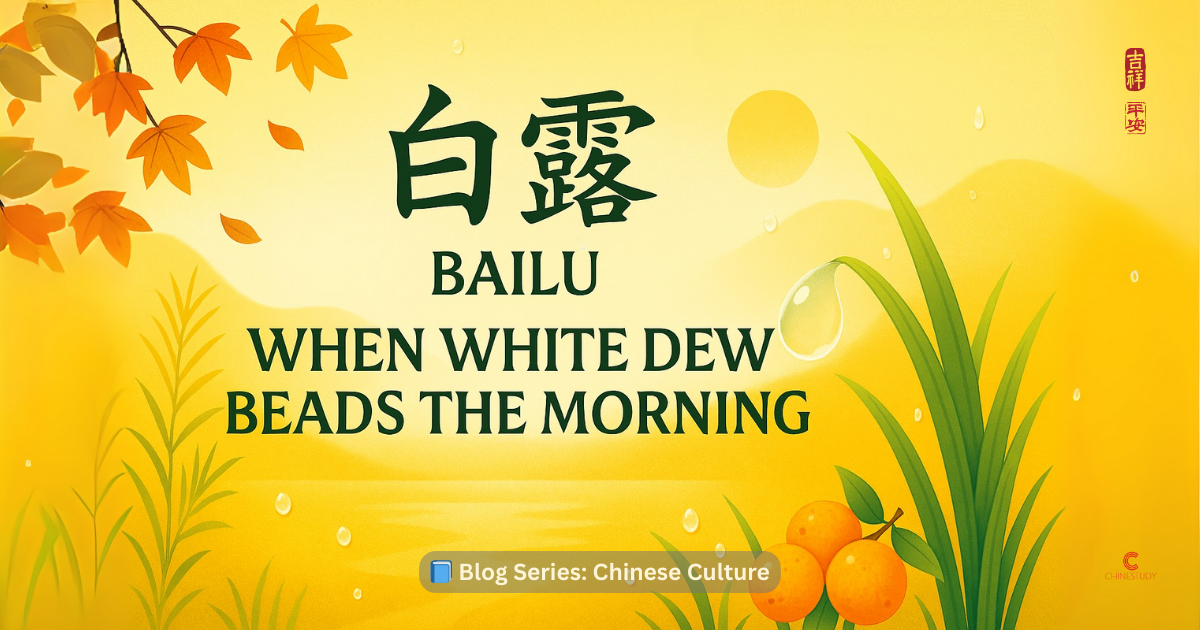❄️ 白露 Báilù – When Dew Turns White

🌿 What Is 白露?
白露 (Báilù), meaning White Dew, is the 15th of the 24 solar terms in the traditional Chinese calendar.
It usually falls around September 7th or 8th, when coolness deepens, dew appears on plants, and mornings feel colder.
This solar term marks a clear shift — summer is truly over, and autumn begins.
🍃 What Does It Mean?
The name 白露 (Báilù) combines:
• 白 (bái) – white
• 露 (lù) – dew
It paints a beautiful picture: cool mornings, soft white dew shining on leaves, and the crisp quiet of early autumn.
The “white” dew reflects the light, showing how nature is slowing down and preparing for the colder days ahead — a poetic symbol of change in Chinese culture.
🌿 How People Celebrate
Unlike major holidays, 白露 Bái lù is quietly observed, especially in the southern parts of China. But it still brings small seasonal rituals and traditions:
- Eating longan (龙眼 lóng yǎn): In Fujian and Guangdong, people eat fresh longan during 白露 Bái lù, believing it nourishes the body and boosts energy as the weather turns cooler.
- Drinking white dew tea (白露茶 Bái lù chá): In some areas, people collect dew from plants early in the morning to brew tea. It’s believed to be pure and refreshing — a rare treat of the season.
- Keeping warm (保暖 bǎo nuǎn): Families start preparing warmer clothes and blankets. Elders may begin using herbal soups to strengthen their bodies for the cooler days ahead.
Though subtle, these customs reflect how people respect nature’s rhythm and adjust their lives accordingly.
🗣 Key Vocabulary & Expressions
• 白露 (bái lù) – White Dew
• 露水 (lù shuǐ) – Dew
• 秋风 (qiū fēng) – Autumn wind
• 龙眼 (lóng yǎn) – Longan fruit
• 秋天 (qiūtiān) – Autumn
• 保暖 (bǎo nuǎn) – Keep warm
• 收获 (shōu huò) – Harvest
💬 Try This!
Translate and read aloud:
白露的时候要注意保暖。
(Báilù de shíhou yào zhùyì bǎo nuǎn.)
→ You should keep warm during Báilù.
🇨🇳 Cultural Insight
In Chinese culture, each solar term isn’t just a date — it’s a signal from nature.
白露 Báilù reminds people to:
- Slow down and notice subtle changes in the air
- Respect seasonal balance, both in health and in daily life
- Harvest wisely, as crops reach their final growing stage
It also marks the moment when Chinese poetry and art often turn more reflective. Many famous poems mention white dew, cool moonlight, or early autumn sadness — all connected to this time of year.
🌟 Final Thoughts
白露 Bái lù tells us autumn is not just coming — it has arrived.
There’s something poetic about this moment:
A bit of chill in the air, dew shining like pearls, and the world slowing down.
🌙 So, sip some tea, pull on a light sweater, and enjoy the beauty of White Dew.
🇨🇳 Curious about more Chinese traditions?
📚 Step into the blog series: Chinese Culture!
Thank you for subscribing!
Have a great day!